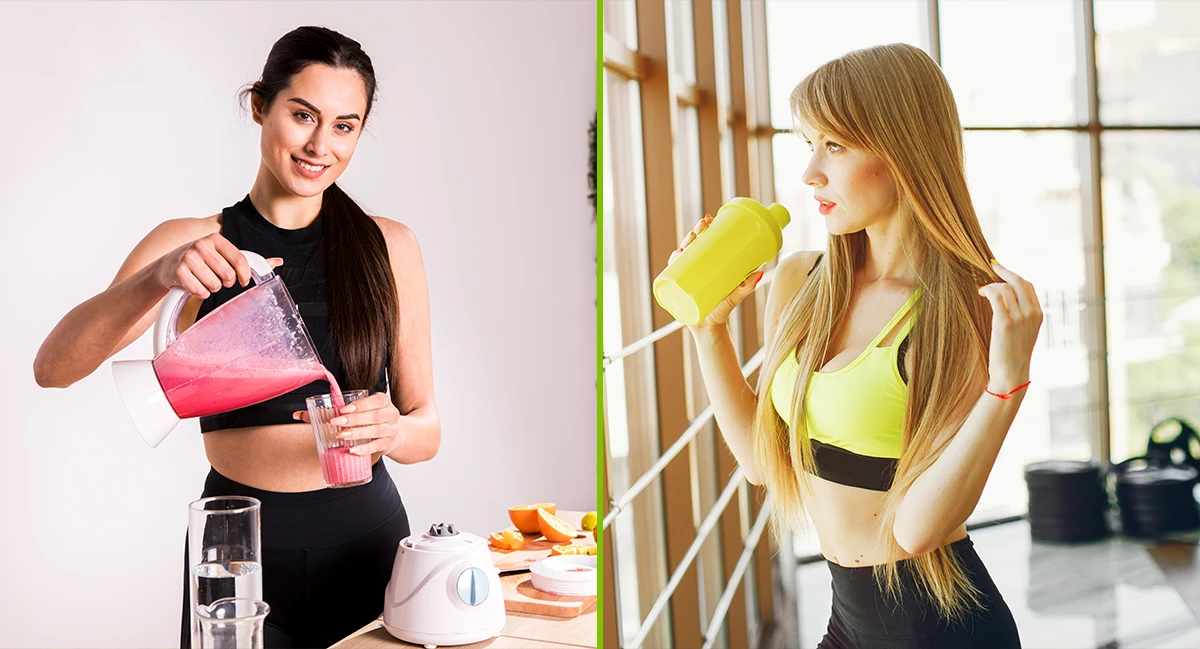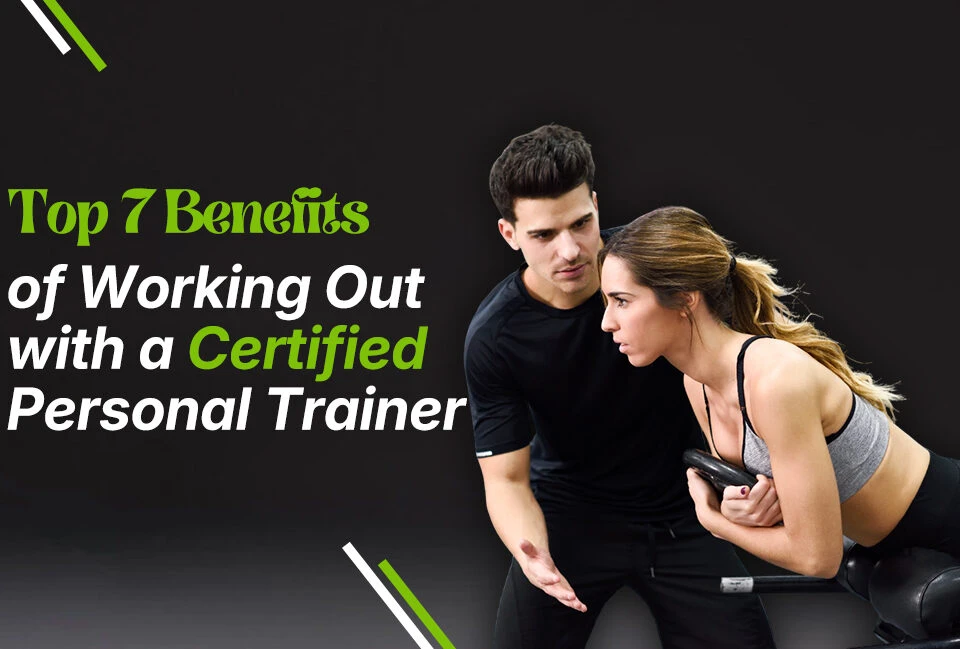Eat Right, Train Hard: What to Eat Before and After Your Workout

Whether you’re an athlete or a casual gym-goer, understanding the role of carbohydrates and protein in your diet is crucial. These nutrients, when consumed before and after a workout, can significantly enhance your flexibility, strength, stability, and agility. This comprehensive guide will help you make informed food choices about what to eat before & after your workout.
What to Eat Before and After Your Workout
Appropriate nutrition and a balanced diet are essential in order to get a fit body. Refueling the body after a sweat-dripping session will help the body recover from exertion and build muscle strength.
In contrast, the pre-workout meal will provide you the energy to spend hours on the treadmill and lifting heavy weights.
Let’s understand the importance of pre and post-workout meals in brief.
Why A Pre-Workout Meal Is Necessary?
As you hit the gym or go for a long morning walk, your body requires the energy to fuel the workout, so go for a light meal one to two hours before. Maintain a balance between overeating and an empty stomach, as eating without a limit can lead to stomachache.
What to Eat Before a Workout
-
Set Time For Pre-workout Snack Right
Before going to the gym, keep a duration of 30 minutes to 3 hours after taking the first meal of the day. If you prefer early morning workouts, instead of eating a full meal, go for a small snack or mini-breakfast like a fruit and yogurt smoothie, a low-fat latte, and an apple, egg, and whole-wheat toast, and one of the most preferred fruits by gym goers, that is banana.
But in case you are going to exercise later in the day, either work out 3 hours after a balanced meal or if you had a snack, start exercising after 1 hour. The snack should be low-fat, high in carbohydrates, and adequate in protein, such as half a turkey sandwich, whole-wheat tortilla with peanut butter and a banana, or oatmeal with fruit and nuts.
-
Stay Hydrated
Getting your body hydrated is the first and most essential thing that you should do after getting up. As you are going to sweat a lot during strength-requiring gym sessions, a good intake of water, which is two glasses around two to three hours before exercise, is a must, and one glass of water about 10 to 20 minutes before working out.
A dehydrated body can lead to dangerous changes in the body, like muscle cramps or spasms, low energy, and many more. If you are working in a heated environment and sweating a lot, sip one cup of water every 15 to 30 minutes to keep your body active and hydrated.
-
Prefer Protein-rich Pre Workout Snack
If you are performing intense workout sessions like weight lifting or training, a portion of protein should be a part of your diet. The body needs protein to repair the micro-tears that get caused while lifting weights.
For a rich source of protein, include food items like low-fat yogurt, soya protein, a glass of regular or soy milk, cottage cheese, nuts, and Greek yogurt.
-
Pre-workout snack with carbs
If you are performing long workout sessions, carbohydrates will help extend your endurance and maintain your timing and attention. It is considered necessary for training sessions that go more than 60-90 minutes. Having carbs before a workout means you’ll have extra glucose to fuel the exercise at maximum capacity.
A lack of glucose during a workout will make you feel weak and tired and will make you quit or take repeated breaks in between. Sources of carbs that should be a part of your diet are protein shakes, oatmeal, bananas, crackers, a rice cake, yogurt, homemade protein bars, and many more.
Below are some of the snack recommendations for Pre-Workout-
- Dried fruit with mixed nuts
- Wholegrain toast with low-fat cheese
- Egg or tuna sandwich
- Oatmeal with peanut butter and fruit
- Baked salmon, brown rice, and roasted veggies
- A slice of sourdough
- Coffee and collagen
- Greek yogurt and fresh fruit
- Wholegrain crackers with hummus
- Oats made with low-fat plain milk
Why A Post-Workout Meal Is Necessary?
So now you have completed a sweat-drenching exercise session, lost so many calories, flexing your muscles in front of the mirror, and feeling that you can eat anything you want as you have already performed an intense workout might lead to adverse effects in the body.
As you lose so much energy, a rich and balanced meal will be the only requirement of the body. During exercise, our muscles tear, and a post-workout meal will help in muscle repair and growth.
Consider eating in an hour immediately after a workout as the body uses the protein you eat to build new muscle and helps stop the breakdown of the existing muscles.
So, to restock your energy, have a protein- and carbohydrate-rich diet in your post-workout meal, too. Here are some food items that you should consider after a workout.
-
Drink plenty of water
Before giving the body a protein-rich diet, it is necessary to hydrate the body as you have already had a sweat-dripping session. Depending on the intensity of the exercise, the atmosphere you are working in, and the body’s requirement, getting a good quantity of water should be the first step after exercising.
As seen in many sports, there are breaks in between matches to rehydrate the player’s body. Water intake mainly depends on how much you sweat, the water your body gets from fruits and vegetables, and many other factors.
-
Proteins repair and build muscle
Depending upon training volume, intensity, and frequency, exercise activates the breakdown of muscle protein, and a sufficient amount of protein gives the body amino acids to repair and rebuild these proteins. In addition, it improves muscle recovery, workout performance, and composition of the body.
-
Carbs for recovery
To reduce the significant decrease in immunity after a long exercise workout session, consumption of carbohydrate-rich foods is vital. It helps to replenish glycogen stores as intense training sessions such as weight training and bodybuilding can use the glycogen stored in the body.
A recent study revealed that 3.6 to 5.5 g of carbs per 8 to 12 g per kg of body weight each day helps maximize your glycogen stores. Food items like apples, bananas, sweet potatoes, grains, quinoa, milk, and yogurt are carbohydrate-rich.
Set A Limit With Vitamins
If you are considering vitamins for advantage and taking them in excessive amounts, then you need to stop, as they can block the benefits of exercise. Recent studies also revealed that athletes who prefer vitamins after an intense workout session are more likely to suffer from inflammation and molecular stress while recovering.
Although vitamins are essential to the body, overdoing it can lead to negative impacts.
Below are some of the snack recommendations for Post-Workout:
The following food items will help you regain the strength to repair muscle tears-
- Salmon with sweet potato
- Tuna salad sandwich on whole grain bread
- Tuna and crackers
- Cottage cheese and fruits
- Grilled chicken with roasted vegetables and rice
- Egg omelet with avocado spread on whole-grain toast
- Pita and hummus
- Rice crackers and peanut butter
- Quinoa bowl with berries, sweet potatoes, and pecans
- Oatmeal, whey protein, banana, and almonds
- Greek yogurt, berries, and granola
- Protein shake and banana
The Bottom Line
Consuming the right amount of carbs and protein before and after a workout is essential. From cycling and jogging to strength training and weightlifting, your body requires a lot of energy to perform. So, going to exercise on an empty stomach may lead to weakness and not being able to perform the exercise that you want to get the desired results from. Even a single banana can help you a lot.
Similarly, post-workout meals are meals are vital for the body as you have already drained a lot of energy that the body might require to muscle repair and growth. Always remember to drink plenty of water. There are various food options provided above in the blog that will help you get a protein- and carb-rich diet.
FAQs
1. Why a post-workout meal is necessary?
As you perform the exercise, your body uses up stored glucose, called glycogen, and muscles get depleted of glycogen. In addition, some proteins in the muscles get damaged and broken. So, getting the proper balanced and nutrition-rich after a workout restores energy levels, helping the body to build strength and repair muscle for future workouts. Fueling the body will help decrease muscle protein breakdown, increase muscle growth, enhance recovery, and improve your mood.
2. What are the Protein-rich pre-workout snacks that will help fuel the body?
Some of the protein-rich foods are – a glass of regular or soy milk, Greek yogurt, a slice of turkey, nuts, a banana with peanut butter, chocolate milk, a granola bar, packet of oatmeal made with milk, a sports drink, a banana, etc.
3. What is best to eat before and after a workout?
For before and after workouts, one common thing is a protein and carbs-rich food. A pre-workout meal with proteins and carbs will help you gain the energy that your body will require to perform the intense workout sessions. Whereas a post-workout meal with balanced nutrients will support muscle repair and growth, and restore energy levels.
4. What should you eat 30 minutes before a workout?
If you are eating 30 minutes before the workout, prefer something that is easy and takes no time to digest, such as banana, cereal, coconut water, pineapple and watermelon, bagels, rice cakes, protein bars, etc.
5. What are the meals that I can have after post-workout?
> If you are going to work out within 2–3 hours or more-
- lean protein, brown rice, and roasted vegetables
- sandwich on whole-grain bread
> If you are going to work out within 2 hours –
- whole-grain cereal and milk
- protein smoothie
- oatmeal topped with banana and almonds
> If you are going to work out within an hour –
- banana
- protein bar
- greek yogurt and fruit


